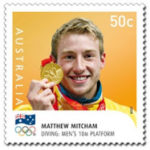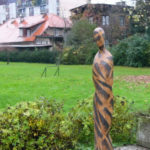Gay Life in Beijing, China:
Shiny Windows and Shadow Lives
China has a population estimated at 1.3 billion people. A conservative estimate of 5% makes for 65 million LGBT citizens. But one would never know it given the invisibility of the community there.
October 2013
By Richard Ammon
GlobalGayz.com
(Note: this story is only about gay Beijing. By many reports, Shanghai, China’s most dynamic and cosmopolitan city, is the country’s most open metropolis for LGBT nightlife and lifestyle.)
Introduction 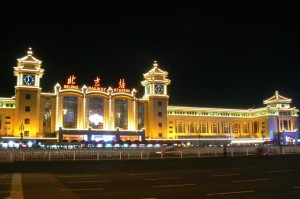
China has a population estimated at 1.3 billion people. A conservative estimate of 5% makes for 65 million LGBT citizens. But one would never know it given the invisibility of the community there. It is hard to get an accurate take on the general gay scene in China because of its vast physical size, the density of the cities, the scarce and scattered location of LGBT venues, fearful closeted gay people, social homophobia, general ignorance and the continuing oppressive attitude of authorities toward people who are different. (photo right: Beijing Train Station)
There are. however, small windows of tolerance from the omnipresent big brother state (which has human and electronic eyes everywhere) that has in the past 10-15 years cautiously allowed occasional gay venues to open (and close) in the biggest cities. In Beijing there are a handful of gay and gay-friendly bars and clubs such as Destination, Funky’s and Alfa that have been around for several years, all behind closed doors. There is no public scene. “Parades are not allowed in China, any kind of parade,” said James, a native of Beijing, sitting across from me at the Paragon Hotel Rainbow Restaurant (a non-gay coincidence) around the corner from the enormous Beijing Train Station.
“To hold a public gay festival is out of the question. Last year the authorities shut down an attempt to have a LGBT film festival at a public theatre. They pressured the owner to refuse showing any of the films, so we finally resorted to a much smaller program of screenings at one of the gay-friendly embassies here.”
Different Views
A casual visitor to Beijing will see a huge bustling city of 21 million people with gleaming big muscular buildings, well-stocked stores, lots of shiny new status cars including a plethora of Mercedes, BMWs, Audis and Buicks among many other Eurocars. (There are many more people who cannot afford any kind of car.) There are ‘millions’ of eateries from local noodle shops with neatly uniformed clerks offering kung pao chicken to elegant high end haute cuisine night clubs 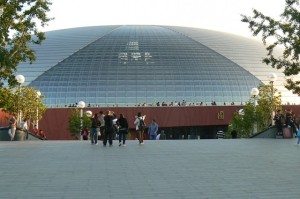 offering delicacies such as eel steak. Aside from the popular historic sites like Tiananmen Square the new jewel in the crown, or rather shining star of the people, is the enormous and dramatic China National Performing Arts Center, (photo left) a dome-shaped glass and steel wonder surrounded by a moat.
offering delicacies such as eel steak. Aside from the popular historic sites like Tiananmen Square the new jewel in the crown, or rather shining star of the people, is the enormous and dramatic China National Performing Arts Center, (photo left) a dome-shaped glass and steel wonder surrounded by a moat.
But linger for a while and a visitor will hear about the shadow side of Chinese life, the control and limitation of free speech, the forced eviction of families from their homes, state control of commercial innovation, dominance over Tibet–and a distinct limit on gay expression. In addition to a ban on public queer activity, police occasional and haphazardly raid a gay venue in the guise of suspected underage or drug abuse. In recent years they have also shut down the Mr Gay China pageant and voided the above-mentioned film festival. The macho ethos of law enforcement is rife with ignorance about LGBT issues as well as secretive ‘gifts’ to keep them at bay from gay-frequented bars and clubs. It is very difficult, said James, to penetrate into the insulated world of authority in China in order to educate the leadership about gay issues. “There are so many departments and levels of authority and shrouds of secrecy that we hardly know where to begin but they do allow a few of our venues to continue business without much harassment. So I guess we can call that progress of sorts.”
A recent report about gay life in Beijing by Jonathan Levine (CNN June 28, 2013) tried to sound upbeat as if there were a measurable increase in tolerance for gays but the story reported only a bit of gloss in the 2008 opening of the Beijing LGBT Center and featured a couple of activists who were verbal about the Center as a ‘safe space’ and its several services including individual counseling for youths discovering their identities.
Some of the Center’s 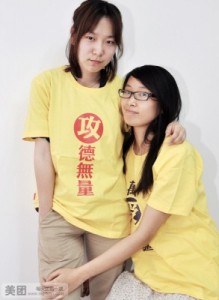 members had also staged a few ‘demonstrations’ such as two lesbians “demanding a legal marriage certificate at Beijing’s Dongcheng District Civil Affairs Bureau,” which only a handful of supporters witnessed.
members had also staged a few ‘demonstrations’ such as two lesbians “demanding a legal marriage certificate at Beijing’s Dongcheng District Civil Affairs Bureau,” which only a handful of supporters witnessed.
Brave as they want to be, most gay activists are not out to their families and live double lives to protect themselves and their families from the usual shame and dishonor associated with homosexuality–which, across the 3.7 million square miles of rural China (same size as USA) is barely known or understood. This is not to minimize the brave efforts of these few advocates. The forces of disapproval and censorship from the Chinese government are overwhelmingly formidable and any small effort is a step forward into a future of tolerance in this monolithic socialist system.
Virtual Reality
That said, this is the age of the Internet, a phenomenon far bigger than communism or capitalism whose virtual reality is fast becoming social reality. The majority of modern, hip LGBTs–people who realize their orientation, know it to be natural and are asserting their right to physical and emotional fulfillment– have smartphones (photo left) with apps, phone numbers, messaging, URLs of dating sites, social networking Facebook substitutes such as Feizan.com (translates as Fly Like) and Jack’d (“China’s first gay-targeted “social networking”, 2013). 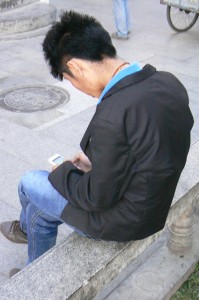 Grinder is now back online in China after a period of being blocked. There is the ubiquitous Craigslist that includes the standard ‘Men Seeking Men’ category of search. (I checked out the first hundred listings which contained the usual photos of ‘equipment’ as well as, surprisingly, many facial photos of “vgl” guys seeking contact and hook-ups. There are many ads from Beijing but more are from Shanghai.) The LGBT website Utopia-asia based in Bangkok, lists numerous organizations, bars and clubs in Beijing all with websites full of locations and activities.
Grinder is now back online in China after a period of being blocked. There is the ubiquitous Craigslist that includes the standard ‘Men Seeking Men’ category of search. (I checked out the first hundred listings which contained the usual photos of ‘equipment’ as well as, surprisingly, many facial photos of “vgl” guys seeking contact and hook-ups. There are many ads from Beijing but more are from Shanghai.) The LGBT website Utopia-asia based in Bangkok, lists numerous organizations, bars and clubs in Beijing all with websites full of locations and activities.
Perhaps nothing in the world of gay China has changed the private lives of LGBT Chinese people more than this virtual scene in recent years. Where once there were countless isolated LGBTs in China there are now thousands of eager-to-connect horny and/or loving men and women who have access to like-minded others. And not just for sex. Social networking is the most consuming and dominant need of human life, everyday all the time for everyone, from partner intimacy to broad political support. Denied social intercourse of the human kind a person withers into depression, anger or isolated silence.
For countless centuries homosexually-made people suffered or suppressed or lived in private ignorance of what could never be spoken. Now sleeping beauty has awakened and those 65 million LGBT Chinese are starting to pay attention to the sound and presence of their authentic selves. Not all, of course, are waking up; that will take more generations of economic development, government mutation and social networking to reach small towns in the far west. A sign of the changing times, however, are the countless cell phone towers I saw scattered wherever I went in China and Tibet. from hilltops to building tops. I’m tempted to say ‘everyone’ has a hand-held device but that is far from true the farther one travels away from urbane centers. But in the cities countless people are looking done at their palms.
Lunch with James
James Yang is an officer at the LGBT Center. He is a handsome young man of 39 who spent twelve years in San Diego at university and afterwards worked as an accountant. Like most people of Asian descent he has smooth skin, keen dark 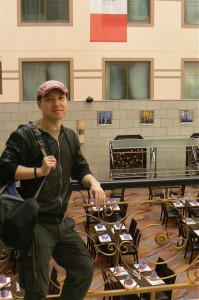 eyes, a playful smile and fashion-model lips. In America he reveled in the celebrations of gay Pride and freedom of sexual expression that he now cannot have in China.
eyes, a playful smile and fashion-model lips. In America he reveled in the celebrations of gay Pride and freedom of sexual expression that he now cannot have in China.
He had a romance for a couple of years which faded over time. He is an only child although he was born two years before the government opposed its one-child-only policy in 1979. He currently lives with his parents in order to minimize his living expenses so he can afford to work for low pay for the Center. We talked about the LGBT scene here and the small changes as well as the resistance to change from the government toward gay life and gay rights.
James said the unquestioned ruler, arbiter and authority over Chinese life is the communist government that’s infused with paranoid self-interest in keeping the status quo. “The government can do anything it wants. It can condemn an apartment building and make people move out of their homes, and it can shut down an intended LGBT film festival.”
A few venues (bars and clubs) are alive and well here and some LGBT orgs such as AIBAI, PFLAG, the LGBT Center which wisely steer clear of political advocacy.
A big par of LGBT socializing seems to be informal networking among NGOs, embassies, private companies at private events such as a film showings, art exhibitions, an intercultural exchange of goods, services or travel promotions, a magazine inauguration. (I went to the ‘Time Out Beijing’ opening party.)
Coming Out the Hard Way
During his time in San Diego his parents came to visit the first time, which turned out to be a disastrous coming out event when his father became suspicious about his living situation with his ‘roommate’. Although his boyfriend at the time was not there, his father put 2 and 2 together and finally just asked straight out ‘are you gay’? James answered truthfully; his father was not surprised but his mother was so upset she demanded they change their return flight and departed the next day. It was not a happy moment in the family.
However, that was almost ten years ago and they subsequently returned to visit James a couple more times in the USA and actually were willing to go to the San Diego Gay Pride parade one year and appeared to have an enjoyable time, including meeting numerous friends of James whom they realized were all gay as well. Time passes, minds change, lives move on.
Today he is between love affairs and “looking” as he spends time at the LGBT Center in Beijing as Development Director. As well he does private tutoring of Chinese high school students to prepare for the American SAT college test. Chinese prosperity has made more than a few upper middle class families most of whom want their kids to study in the USA, both for prestige and investment purposes.
Making Change
James (Zhen in Chinese) says he was spoiled by his time in San Diego, But he did not lose his sense of proportion and commitment when he moved back to Beijing.
He feels a strong sense of devotion to the cause of human-gay rights in China. Slow as that change may occur he is confident it will happen over time as homosexuality has merged into the mainstream of social and cultural life, including political softening. Homosexuality was decriminalized in 1997 and was declassified as a mental illness in 2001.
Globalization is effecting every major issue today from finance to preforming arts. I reminded James that all UK and US ambassadors were mandated in their worldwide assignments to advocate for LGBT equality, as a strong sign of change. Equally impressive is the UN Secretary General’s highly verbal advocacy of that equality.
The younger generations are becoming more gay aware and supportive as they move into positions of leadership and likely will loosen China’s government-sponsored paranoia about freedom of expression. (It wasn’t always so. Throughout China’s dynasties there are numerous reports of emperors and courtesans who kept same-sex favorites.)
At the LGBT Center in Beijing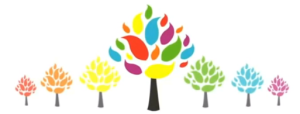
“The Beijing LGBT Center (the Center) is a non-profit, community-based organization that empowers the Beijing lesbian, gay, bisexual, transgender (LGBT) community through offering social services, organizing advocacy programs, and providing a safe, fun, and inviting social space.” So says their website introduction. (http://bjlgbtcenter.org/en/index.asp). Facebook: https://www.facebook.com/bjlgbtcenter
Under the effective leadership of Stephen Leonelli (photo left) during the first five years of it existence, the Center organized itself, defined its mission, found a (third) new location and established services to educate, reach out with compassion 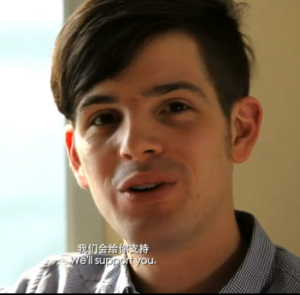 and support for all LGBTs in Beijing. It is now a place to minimize the hurt of discrimination and experience dignity through interpersonal talking and listening and participating in projects and programs. Since the establishment in February 2008, staff and volunteers are confident they have achieved these goals by focused programming in three essential areas:
and support for all LGBTs in Beijing. It is now a place to minimize the hurt of discrimination and experience dignity through interpersonal talking and listening and participating in projects and programs. Since the establishment in February 2008, staff and volunteers are confident they have achieved these goals by focused programming in three essential areas:
-Mental Health Services
“The Beijing LGBT Center provides important social services for our community. This includes weekly group therapy for men and women, as well as one-on-one individual therapy.”
-Advocacy Programs
“The Center has reached out to schools and companies “to increase their diversity and strengthen inclusiveness for LGBT people. We also organize annual community actions for Valentine’s Day and International Day Against Homophobia & Transphobia. We regularly host speakers and activists to share knowledge and experiences with our community.”
-Social Activities and Interest Groups
“The center provides a platform for members of our community to meet and know each other in fun, social settings; activities include weekly film screenings, English cross-cultural discussion groups, improvisation and storytelling, book discussion. Each week we organize between six to eight social activities, bringing in nearly 100 visitors each week.”
Last year to celebrate the Center’s 5th anniversary it produced an information video entitled “From Me to We” intended for personal outreach and educational venues. (http://www.youtube.com/watch?v=dG8RsEbAs20) The video is a touching, sincere and confident portrait of committed organization of once-isolated LGBTs who now celebrate their identities within a felt community of caring friends. The Center is a sister center to the Los Angeles Center who have advised and helped the Beijing Center to coalesce into a well organized source of compassion and support for China.
The Center also sponsored a ‘worm’ event, a fundraising gathering at a bilingual bookstore in Beijing called Bookworm which is gay friendly that some corporate and diplomatic types attended. Much of the Center’s funding comes from embassies and private international companies. Most of the work to make these events happen is done by volunteers who also care about rights and freedom of expression, much as that is muted. Volunteers are mostly gay, but not all, and some are students who want to perform community action that makes a difference.
The Center also sponsors a ‘La-La class’ for lesbians which are social activities that allow young women to network and find common ground friends. There are also counseling and therapy services available to Center attendees if needed.
As with many human rights organizations in repressive countries advocates play a cat and mouse game with authorities as they arrange activities and meetings. Throughout Beijing incredibly vast downtown and suburbs of 21 million people, there are other scattered LGBT-minded groups such as the ‘gay chorus’, called Shining Jazzy (http://galachoruses.org/blog/shining-jazzy-chorus-video-from-beijing/) that has performed in public (although not identified as gay).
Another progressive association is Aibai Cultural and Education Centre (http://www.aibai.com/briefing/The_Human_Sexuality/briefing.html) an educational and advocacy group for improved sex education in China. An important part of their work was to translate into Chinese a well respected book (photo right) on human sexuality entitled ‘The Human Sexualit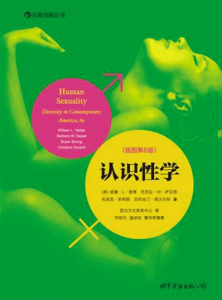 y’. “It is a college textbook co-authored by several American scholars who have conducted studies on sexuality education for many years. This book gives a full introduction on sexuality through sexual necessity, biological and psychological perspectives, sex roles, sexuality and popular culture and sexual difference, and has been published to its seventh edition in the U.S.”
y’. “It is a college textbook co-authored by several American scholars who have conducted studies on sexuality education for many years. This book gives a full introduction on sexuality through sexual necessity, biological and psychological perspectives, sex roles, sexuality and popular culture and sexual difference, and has been published to its seventh edition in the U.S.”
Further Research
Further research about LGBT life in China is conducted by Gary Wu, Chinese name Wu Chun-sheng. (http://andrejkoymasky.com/liv/fam/biow3/wu01.html) who has recently produced a research report on homosexuality in Beijing (supported by corporate donations), the first such project studying the demographics and issues relevant to LGBT people. Wu is also the author of the book ‘Black Souls Under The Red Sun’ (1990) that is still banned in China today.
Another source of LGBT inside life in Beijing is Danlan.org, a dating and information and news site with up-to-date reports on the LGBT scene. (http://en.danlan.org/search.asp?KeyWord=China&soption=1) “Danlan.org is the largest portal gay website in mainland China; we provide the latest news about the LGBT community from all over the world. We offer dating connections, a magazine, literature, a blog and more.” See http://en.danlan.org/about.htm
Another is the Rainbow Center that does anonymous HIV testing and counseling. Their work is armed at all sexually active people in Beijing and are non-discriminatory. One of their programs is aimed at sexually active university students: “Men who have sex with men and are enrolled in Beijing universities recently have been offered 50 yuan, or about $6.50, and free medical care if they agree to undergo voluntary HIV counseling and testing… ”
(Also see: (http://www.kaiserhealthnews.org/Daily-Reports/2007/September/21/dr00047682.aspx?p=1)
There is also a PFLAG branch in Beijing which is mostly mothers, said James.
Social Networking–Looking for Mr Right
Long before today’s scene, the search for intimate LGBT companionship in China was alive and fervent. Gay love has a long history, as reported recently in a June 2013 report published in the English newspaper China Daily (http://www.chinadaily.com.cn/china/2013-01/06/content_16086464.htm). Chinese sociology scholar Pan Guangdan has deeply researched the history of same-sex attraction in China and found that homosexuality as a aspect of social life was both natural and historic, going back to centuries BCE. “By the Jin Dynasty (1115-1234), homosexuality had become a common practice among the upper classes and is frequently mentioned in official reports,” said Pan in his survey of human sexuality.
History is a mix of fact, hearsay and myth that is always open to interpretation especially regarding human sexuality which has been greatly exaggerated and vehemently demeaned over centuries of cultural and religious evolution. The  extent and depth of homosexuality in the Chinese culture ranges from tender and brutal. One of the enduring tender myths is about emperor Ai of Han (27 BC – 1 BC) who allegedly awakened after a nap to find the sleeve of his silken robes underneath the still-sleeping body of his beloved concubine Dong Xian. (photo left) Without disturbing his adored one, Ai cut off his sleeve and got out of bed. To this day, same-sex love between males has often been called the ‘passion of the cut sleeve’, a euphemism for a gay relationship often used by LGBTs who prefer not to use more obvious words.
extent and depth of homosexuality in the Chinese culture ranges from tender and brutal. One of the enduring tender myths is about emperor Ai of Han (27 BC – 1 BC) who allegedly awakened after a nap to find the sleeve of his silken robes underneath the still-sleeping body of his beloved concubine Dong Xian. (photo left) Without disturbing his adored one, Ai cut off his sleeve and got out of bed. To this day, same-sex love between males has often been called the ‘passion of the cut sleeve’, a euphemism for a gay relationship often used by LGBTs who prefer not to use more obvious words.
As well, modern history has not been kind to LGBT citizens. With the fall of dynastic China and the coming of communism in 1949, same-sex activity was banned. Offenders were sent to jail and ‘reeducation’ centers and received corporal punishment.
Far from Emperor Ai’s silken sleeves, I asked James, since he is in the ‘market’ for a boyfriend, where a gay person can meet others. Among the cat-and-mouse maze of activity in Beijing he said there are various functions such as dances, meetings, seminars, embassy receptions, talks that expand into friendship networks where he can mingle. As a result he has a core group of friends who know other friends and the circles expand over time. James sheepishly admitted he has made overtures to a certain corporate manager who appears to have returned mutual smiles and cordiality.
Also there is a suburban area called Sanlitun that is a current social hot spot. The streets and shopping mall there are a draw for the young in-crowd to gather, wine, dine and cruise. All quite trendy, bubbly and no doubt noticed by big brother’s eyes and ears. James likes to go there with friends to loosen up from his usual confined living and working situations.
To get a stronger jolt of gay energy, James intends to attend the upcoming LGBT Pride Parade in Taiwan (http://en.wikipedia.org/wiki/Taiwan_Pride) which is a highly out and loud event, one of the best in Asia. “It’s a far cry from what can happen now in Beijing. Being gay in Taiwan is a world apart from here,” he said. “They are talking about authorizing gay marriage there.” I reminded him that the mayor of Taipei officiated at a gay ‘union’ there about 5 years ago when the city was evolving a tolerant attitude toward gays.
He thinks that well known gay people should come out to help improve social consciousness about LGBT life. He reported being in a sauna recently and seeing a very well known singer whose popularity could help the cause. “But that’s for him to decide. At the sauna he seemed comfortable chatting (and cruising) with others, like anyone else.”
As James, my partner and I left the Rainbow Restaurant we walked out onto the sun-filled bustling street as I observed that James looked and acted like millions of others Beijingers going about their business, their daily lives. He was not looking for a fight or a rebellion, not for political upheaval. He was an intelligent, compassionate man looking toward a day when communism would finally fail as a system of repressive governance and allow individual freedom of expression, sexuality, creativity and choice; to live and love in his authentic personal manner without proscribed paranoid laws and regulations. The sun was shining and so was his hope.
——————-
Other resources:
LGBT Scene: http://www.utopia-asia.com/chinbeij.htm
Social Networking: http://www.queerty.com/first-ever-gay-social-networking-app-launched-in-china-labeled-a-jackd-copycat-20130604/
Fake Gay Marriage: http://www.thedailybeast.com/articles/2013/04/19/china-s-fake-gay-marriages.html
General Description: http://en.wikipedia.org/wiki/Homosexuality_in_China
Homosexuals in Modern China: http://academic.brooklyn.cuny.edu/core9/phalsall/texts/c-gays.html
Gay Bars and Clubs: http://www.cityweekend.com.cn/beijing/listings/nightlife/lgbt/
LGBT Organizations: http://beijing.angloinfo.com/information/family/lgbt/local-lgbt/



